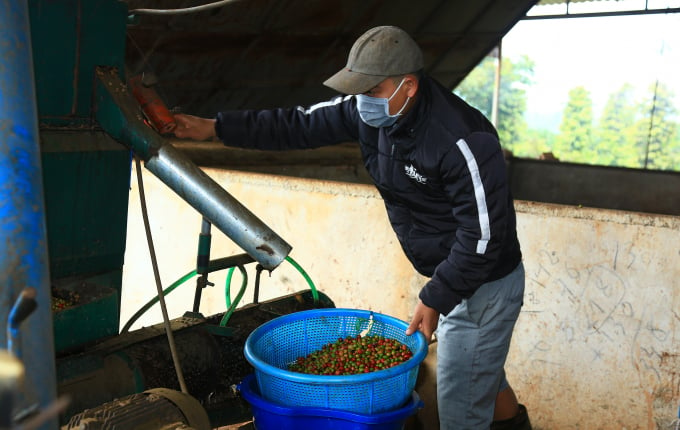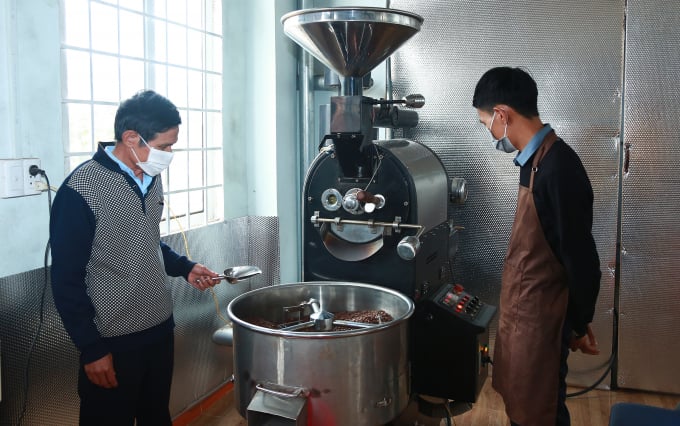May 24, 2025 | 16:27 GMT +7
May 24, 2025 | 16:27 GMT +7
Hotline: 0913.378.918
May 24, 2025 | 16:27 GMT +7
Hotline: 0913.378.918

After being trained by VnSAT, people have focused on picking ripe coffee to improve the quality. Photo: Quang Yen.
After 6 years of implementing the VnSAT project in Dak Nong, the program has helped this locality build and form sustainable coffee areas.
Mr. Nguyen Cong Khanh, Chairman of the Board of Directors and Director of Nguyen Cong Agricultural Service and Trading Cooperative (Dak Mil district, Dak Nong province) said that the cooperative was established in May 2015.
In the beginning, the cooperative faced many difficulties, many types of equipment were lacking. Fortunately, the cooperative has participated in the VnSAT project and has been helped by this unit to build the road to the production area, drying yard, and warehouse. In addition, the project also supports the cooperative to build a medium voltage power station to pull electricity into production.
According to Mr. Khanh, the VnSAT project has selected the necessary items for investment to bring benefits to the cooperative as well as the farmers. These items are very effective after being invested.
“Like investing in a power line in the production area to help farmers pump and irrigate, thereby reducing costs. And concrete roads help people transport agricultural products conveniently and save costs. In addition, the project also supports drying yards and drying houses, thereby meeting food safety and improving the quality of coffee beans. In addition to supporting facilities, the VnSAT project also supports the cooperative with scientific and technical training, which is a base for the unit to develop as it is today, "said Mr. Khanh.
According to Mr. Khanh, the VnSAT project has brought many benefits to cooperatives as well as farmers. The cooperative initially had 10 official members with an area of just over 20 hectares of coffee. Up to now, the cooperative has linked 110 more members with an area of 300 hectares, annual output of more than 1,000 tonnes.

Cooperatives and cooperative groups are supported with equipment to improve coffee quality. Photo: Quang Yen.
Similarly, Mr. Lang The Thanh, Director of Thanh Thai Agricultural Cooperative (Dak Nong province), said that the unit was also supported by the VnSAT project with facilities and training in science and technology.
According to Mr. Thanh, before participating in the VnSAT project, the cooperative lacked machinery and equipment for coffee processing. After that, the VnSAT project supported many machines, the product quality was improved, the price also increased.
“Due to the project, the cooperative can invest in machinery, but the unit on its own can take a lot of time. The VnSAT project organized a training session on sustainable coffee farming for people. From these training courses, people have changed their perception of sustainable coffee farming. After being trained, people can limit the use of pesticides and chemical fertilizers. Especially, people now no longer pick green coffee like in the past, since then the quality of coffee has improved," Mr. Thanh said.
Mr. Pham Hung Vy, Deputy Project Director of VnSAT Dak Nong Project Management Board, said that after 6 years of implementation, cooperatives have benefited greatly from the project's activities.
According to Mr. Vy, the first is training activities. Since then, people and cooperative members have changed their views and farming practices for a long time. Especially, after the training, people are aware of reducing the amount of water used to irrigate coffee trees.
“In the past, people used to irrigate so the amount of water was very large. Currently, people are watering according to an economical model, so the amount of water is just enough, thereby helping to reduce costs and labor. As for fertilizers, farmers are also oriented to only fertilize enough for the plants. Through training, people now only pick ripe coffee, so the quality of coffee is improved. In the past, people used to pick all but now people have started to change their opinion. All picking is not good quality as well as output. The quality of the coffee will increase, so the price will also increase," Mr. Vy said.

The equipping of coffee processing machines will form a sustainable coffee industry in Dak Nong province. Photo: Quang Yen.
In addition to training, the VnSAT project also supports machines, equipment, and drip irrigation systems. The preliminary processing equipment, through the machines and equipment, has greatly improved the quality of coffee. Especially supporting processing machines suitable for the cooperative's scale. For processed coffee products, the selling price is estimated at VND 20,000-25,000 per kilogram.
“Since the project came into operation, the locality has formed two areas of landscape coffee and specialty coffee. The VnSAT project implemented in the province has brought remarkable results. If in the upcoming time, if the project continues to be maintained or another project of similar nature is implemented, a sustainable coffee industry will be formed in Dak Nong province and the Central Highlands as well", Mr. Vy added.
Since the implementation of the VnSAT project in Dak Nong province, 56 cooperatives, and farmers' organizations have received support. In which, 7 cooperatives received support for infrastructure including in-field roads, warehouses, drying yards, and electricity lines. 11 farmer's organizations received equipment such as drying kilns, desiccating machines, dry shelling machines, etc. The total number of supporting equipment is 199 systems, including 39 drying kilns, 56 wet processing machines, the rest are dry peeling machines. The support of these machines greatly improves the coffee quality. Since then, the value of coffee in Dak Nong province, especially in cooperatives, has received enhanced support.
Translated by Ha Phuc

(VAN) The People's Committee of Tra Vinh province has approved an adjustment to the investment policy for the Green Hydrogen Plant project, increasing its area to approximately 52.76 hectares.
![Reducing emissions from rice fields: [2] Farmers’ commitment to the soil](https://t.ex-cdn.com/nongnghiepmoitruong.vn/608w/files/news/2025/05/05/dsc08881jpg-nongnghiep-140632.jpg)
(VAN) Clean rice cultivation model in Thuong Tan commune, Bac Tan Uyen district, is assisting local residents in achieving sustainable agriculture by substantially reducing costs, increasing productivity, and protecting the environment.

(VAN) At the conference to disseminate Resolution No. 68, AgriS introduced its digital agricultural ecosystem and reaffirmed its commitment to accompanying the Government in promoting private sector development and sustainable agriculture.

(VAN) 'Blue Ocean - Blue Foods' initiative is designed to restore marine ecosystems and establish sustainable livelihoods for local communities by cultivating a minimum of 1,000 hectares of cottonii seaweed in the first three years.
/2025/05/21/4642-3-112707_603.jpg)
(VAN) The V-SCOPE project has made direct contributions to three out of six pillars of the Comprehensive Strategic Partnership between Vietnam and Australia.

(VAN) Facing the threat of rabies spreading to the community, Gia Lai province urgently carries out measures to vaccinate dogs and cats on a large scale.

(VAN) Disease-free livestock farming not only protects livestock herds but also stabilizes production and livelihoods for many farmers in Tuyen Quang.